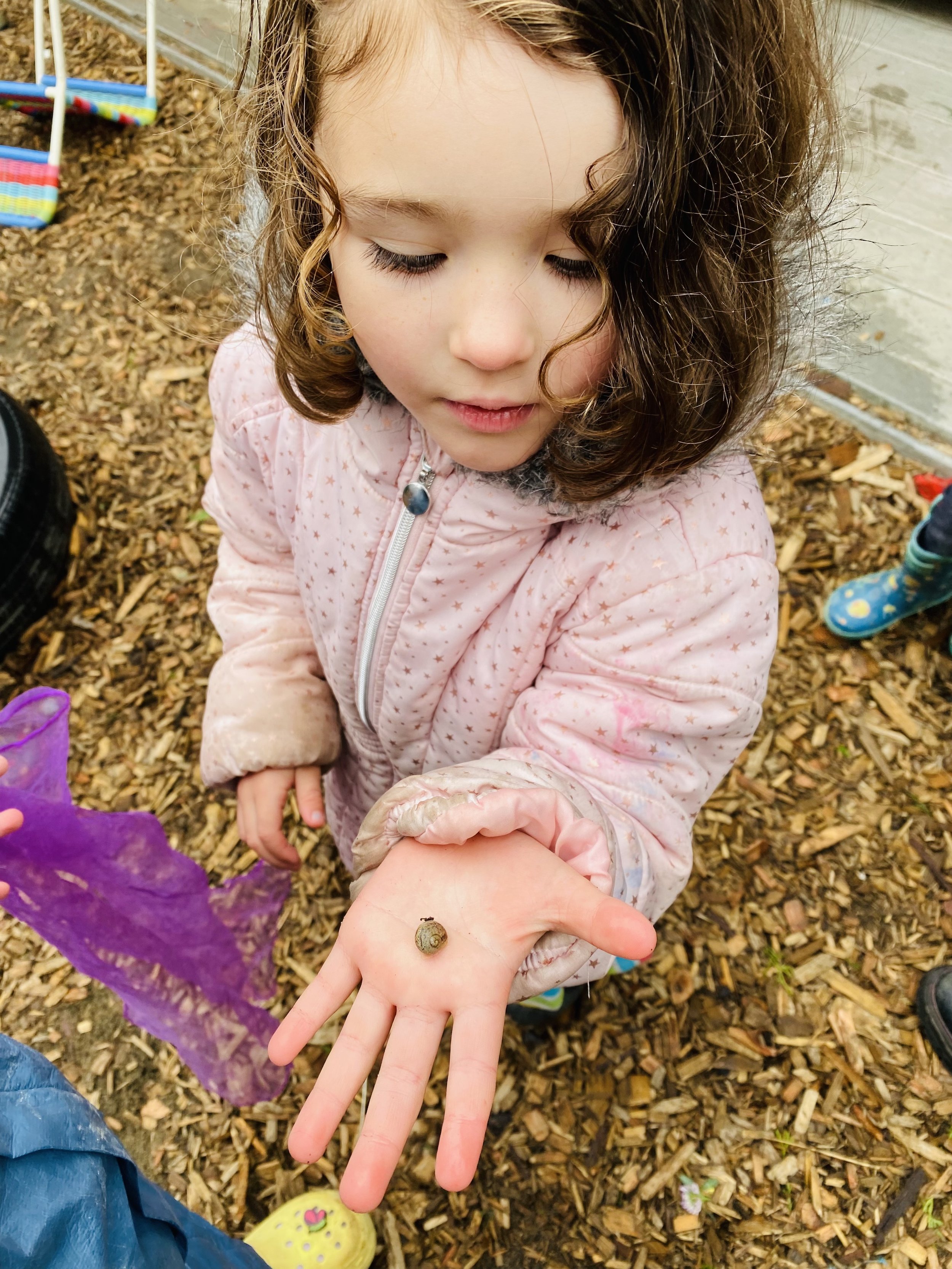Intrinsic Motivation
by Regan Becker
Exploring the Nature Tray with a Magnifying Glass
“The child who has never learned to work by himself, to set goals for his own acts, or to (control) his own force of will is recognizable in the adult who lets others guide his will and feels a constant need for approval of others.” – Maria Montessori, Education & Peace
Montessori philosophy emphasizes respect for the child's self-esteem, personal growth, and self-determination. Montessori de-emphasizes praise, adult approval, punishments, and performance-based rewards. We work to eliminate adult power-over behaviors that reinforce a carceral and punitive learning environment. In a recent staff meeting, we discussed shaming language and ways in which children can experience emotional isolation as punishment.
Practical Life: Washing a Window
Alfie Kohn — an educator and author of books such as Punished by Rewards: The Trouble with Gold Stars, Incentive Plans, A’s, Praise, and Other Bribes — writes about intrinsic motivation versus extrinsic motivation in the classroom and at home: “Punishment and threats are counterproductive. Making children suffer in order to alter their future behavior can often elicit temporary compliance, but this strategy is unlikely to help children become ethical, compassionate decision-makers… Moreover, it models the use of power rather than reason and ruptures the important relationship between adult and child.” Conversely, honoring intrinsic motivation builds self-esteem, independence, and self-motivation in children so that they follow their interests and inspiration.
Building on the Self-Determination theory of educational researchers Edward Deci and Richard Ryan, Kohn explains that “Rewards cause people to lose interest in whatever they were rewarded for doing… Rather, intrinsic motivation (an interest in the task for its own sake) is qualitatively different from extrinsic motivation (in which completion of the task is seen chiefly as a prerequisite for obtaining something else).
Practical Life: Brushing Teeth
Deci and Ryan describe the use of rewards as ‘control through seduction.’ Control, whether by threats or bribes, amounts to doing things to children rather than working with them.” In the absence of rewards, children are inclined to pick tasks that are just beyond their current level of ability. Rewards and punishment tend to limit a child, rather than facilitating their growth.
“The child looks for his independence first, not because he does not desire to be dependent on the adult. But because he has in himself some fire, some urge, to do certain things and not other things.” – Maria Montessori
Practical Life: Folding Laundry
Daniel Pink — author of Drive: The Surprising Truth About What Motivates Us — theorizes that changes within society are moving toward intrinsic motivation and away from external rewards. Rewards may encourage improved performance or increased effort, but results are short-sighted and may undermine the innate desires that often foster innovation, creativity, and fulfillment: "Rewards can deliver a short-term boost -- just as a jolt of caffeine can keep you cranking for a few more hours. But the effect wears off -- and, worse, can reduce a person's longer-term motivation to continue the project."
Pink identifies ways in which external rewards do not work:
They can extinguish intrinsic motivation.
They can diminish performance.
They can crush creativity.
They can crowd out good behavior.
They can encourage cheating, shortcuts, and unethical behavior.
They can become addictive.
They can foster short-term thinking.
Practical Life: Setting a Table
“Praise, help, or even a look, may be enough to interrupt him, or destroy the activity.” – Maria Montessori, The Absorbent Mind
Montessori teachers guide children with Practical Life skills, intellectual inspiration, hands-on work, peaceful solutions, as well as care for the environment and one another. Children desire connection, which is distinct from praise and approval. Instead of saying “good job”, adults can acknowledge a child’s effort and details in their work. Adults might ask a child questions about their creative process and mirror back to the child by asking how they feel about their work. This helps a child to value their own opinion and their own feelings first, before seeking the approval of others.
Finding a snail in the outdoor environment
Adults can:
Rather than using a reward to motivate a child's behavior, emphasize the behavior you value and desire.
Acknowledge traits such as consistency, concentration, honesty, and helpfulness. Model these behaviors and talk about your feelings.
Encourage balance/moderation, following one’s passion, and respecting that everyone works differently at their own pace.
Never use food as a reward or a punishment.
Recognize internally when you feel frustration or urgency. Choose patience and care, instead of acting with power over a child by coercing or manipulating them emotionally or materially.
Practical Life: Pouring a Liquid with a Funnel
Punishment often involves a disconnect between a person’s action and their right to something else. Pink discusses how extrinsic motivators perpetuate either compliance or defiance, because rewards and punishments require an authority making the choices. Intrinsic motivators, on the other hand, involve either engagement or disengagement — which allows the child to remain in charge of their own choices.
Montessori students learn from the environment to value their interests through auto-education, rather than complying with adult marketplace values such as efficiency and productivity. Cleaning up a mess is part of their cognitive and motor development, so it’s not a problem – it’s the work of a 2.5-6 year old. External motivators diminish the value of education, altruism, and compassion by making learning a chore for which a child must be "bought off" in order to perform. Children learn now what to value for the rest of their lives.
Math: Stamp Game Addition
“There is no punishment or reward in our schools to interfere with the joy in the work itself. The only reward is in the completion of the work. It is at this time that internal discipline establishes itself, and the foundations of character are laid.” – Maria Montessori








